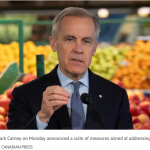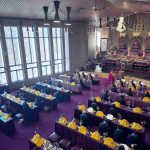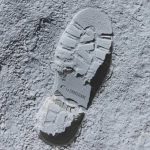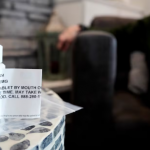捷克佳/三鹿毒奶粉被揭发后,伊利、蒙牛、光明等中国乳品业龙头企业的产品中亦检验出同类问题,职业的敏感立刻联想到本地超市热销的同品牌乳制品。16日晚,与几位从事贸易的朋友联系,得知相关的进口商,并请住在大统华超市附近的朋友前往确认产品名称,于当晚在星网网站和个人博客率先报道多伦多消费者关注中国毒奶粉事件,指在多伦多市面上,至少有伊利和蒙牛两家公司的乳制品在数家超市有售,虽然这些产品均不属于中国官方公布的问题产品。不过,消费者对于同一品牌的产品难免有所忧虑。
之后,本地中文媒体先后跟进报道,英文电视媒体CBC和CTV也在分别在19和20日报道,出于为消费者的安全负责,大统华等超市主动将这两个品牌的软包装乳制品下架。张姓进口商称加拿大食品检验局已经取走样品化验,而他也担心自己、公司和消费者的健康,他也主动将产品送往实验室检验,检验结果将于下周公布。
下面为CBC和CTV电视台18日至20日的相关报道汇总,之前,另有15日至17日CBC网站对中国毒奶粉事件的报道汇总
Chinese yogurt drinks pulled from GTA shelves
Updated: Sat Sep. 20 2008 6:50:58 PM
ctvtoronto.ca

(The Mengniu and Yili brand yogurt drinks have not been officially linked to China’s tainted baby milk scandal.)
Fears stemming from the melanine contamination scare in China have prompted GTA stores across the GTA to pull two Chinese-made yogurt drinks from their shelves.
The Mengniu and Yili brand drinks have not been officially linked to the tainted baby milk scandal that has left four infants in China dead and more than 6,000 sick, but they are made by the company that has been tied to the crisis.
The Canadian Food Inspection Agency has stopped short of issuing a full recall of the company’s products, opting instead to advise consumers to beware. But some local supermarkets have taken it upon themselves to remove the products from their shelves.
T&T Supermarkets — the city’s largest chain of Asian food stores, with locations in Ontario, Alberta and B.C. — has opted to voluntarily remove the products. Many independent retailers have done the same.
No melamine-related illnesses have been reported in the GTA as of Saturday evening.
Tests have revealed that about 10 per cent of liquid milk samples from the Mengniu Dairy Group and the Yili Industrial Group, China’s two largest dairy producers are contaminated with melamine.
In Canada, it’s illegal to use melamine in food.
Melamine is generally used in plastics and fertilizers. While the chemical’s high nitrogen content can make products appear higher in protein, it is also known to cause kidney stones and ultimately lead to kidney failure.
China’s food safety crisis began when the chemical was found to be present in baby formula produced by the Sanlu Group. The crisis widened on Friday after melamine was found in milk produced by three more of the country’s leading dairy companies: Mengniu Dairy Group, Yili Industrial Group and the Shanghai-based Bright Dairy.
Mengniu Dairy Group Co. supplied milk products to Starbucks locations across China, which has since been removed from their stores. Yili Industrial Group Co. was an official sponsor of the Beijing Olympic Games.
Sipping from a carton of milk at a news conference, the chief financial officer of Mengniu apologized for the tainted milk. But he insisted only a small portion of the company’s inventory had been contaminated and said the tainted milk came from small-scale dairy farmers.
“Large-scale milk farms are very disciplined. They won’t take the risk to do something like that,” Yao Tongshan told reporters in Hong Kong.
With a report from CTV Toronto’s Naomi Parness
http://toronto.ctv.ca/servlet/an/local/CTVNews/20080920/gta_china_080920/20080920/?hub=TorontoNewHome
China orders tainted milk products off shelves
Updated Sat. Sep. 20 2008 6:19 AM ET
The Associated Press
SHIJIAZHUANG, China — China’s national product safety agency said all batches of milk that have tested positive for an industrial chemical are being recalled and by Saturday the dairy sections of many stores were empty in Beijing and Shanghai.
China’s food safety crisis widened Friday after melamine was found in milk produced by three of the country’s leading dairy companies — prompting stores, including Starbucks, to yank milk from their shelves.
Sipping from a carton of milk at a news conference, the chief financial officer of one of the companies, Mengniu, apologized for the tainted milk. But he insisted only a small portion of the company’s inventory had been contaminated and said the tainted milk came from small-scale dairy farmers.
“Large-scale milk farms are very disciplined. They won’t take the risk to do something like that,” Yao Tongshan told reporters in Hong Kong. Yao sipped from a carton of milk in a display meant to bolster consumer confidence.
The crisis was initially thought to have been confined to tainted milk powder, used to make baby formula that has been blamed in the deaths of four infants and for sickening 6,200 other children.
But tests found melamine in samples of liquid milk taken from China’s two largest dairy producers, Mengniu Dairy Group Co. and Yili Industrial Group Co., as well as Shanghai-based Bright Dairy. They join the discredited Sanlu Group, whose tainted milk powder and infant formula touched off public complaints.
The chemical, which is used in plastics and fertilizers, can cause kidney stones and lead to kidney failure.
The apparently widespread contamination has rapidly become a political headache for a communist government that hoped to be basking in popular adulation over last month’s successful Beijing Olympics. Instead, the government is being forced to scramble to regain public confidence.
President Hu Jintao, in an address to senior Communist Party members, excoriated local officials for risking the public trust.
“Some officials have ignored public opinion and turned a blind eye to people’s hardships, even on major problems that affect people’s lives and safety,” Hu said Friday in a largely dry policy speech published in state newspapers Saturday.
The State Council, the Cabinet, on Friday ordered hospitals to provide free treatment for sick infants and local officials to redouble efforts to remove all tainted products. Companies found to have produced contaminated milk will later have to reimburse the government for medical expenses, said the State Council order.
All batches that tested positive were being recalled, China’s product safety watchdog said in a report on its website. It pledged to “severely punish those who are responsible.”
Farmers cut corners to deal with rising costs
Melamine, high in nitrogen, makes products with it appear higher in protein. Suppliers trying to cut costs are believed to have added it to watered-down milk to cover up the resulting protein deficiency.
No tainted infant formula has turned up in the United States, where authorities have inspected more than 1,000 retail markets mainly serving Asian communities. China is an importer of liquid milk so it is unlikely that milk from that country would have been shipped to the U.S.
But the Food and Drug Administration said it is stepping up inspections at ports as a precaution. Inspectors will be sampling bulk shipments of food ingredients from Asia that are derived from milk, such as milk powder and whey powder. The FDA also plans to issue a consumer alert warning people not to buy milk products from China on the Internet.
A senior dairy analyst said Chinese farmers were cutting corners to cope with rising costs for feed and labor.
“Before the melamine incident, I know they could have been adding organic stuff, say animal urine or skin,” said Chen Lianfang of Beijing Orient Agribusiness Consultant Co. “Basically, anything that can boost the protein reading.”
But he and others expressed skepticism that so many farmers would know to add melamine to milk. The chemical is not water-soluble and must be mixed with formaldehyde or another chemical before it can be dissolved in milk.
“Farmers can’t be well-educated enough to think of melamine,” Chen said. “There must be people from chemical companies contacting them and telling them it’s a good idea.”
The product safety agency and the Health Ministry declined to answer questions Friday about how widespread the practice of adding melamine to milk was believed to be.
“I don’t know if this is an industrywide problem, but it is definitely not a single case. It is on a massive scale,” said E.R. Hong, an executive of Hua Xia Dairy Ltd., a U.S.-owned dairy farm east of Beijing that has not been accused of supplying tainted milk.
The crisis highlights the growing influence of dairy products in the Chinese diet. Milk is not part of the traditional Chinese diet, but the country’s economic growth and the increased availability of refrigeration have brought about a wide range of products, with flavoured milk and sweetened yogurts among the most popular.
Though per capita consumption of dairy products in China is still low at 1.5 ounces per day, increasingly affluent Chinese consumers are paying more attention to their health and view milk as highly nutritious, particularly for children.
The crisis has raised questions about the effectiveness of tighter controls China promised after a series of food safety scares in recent years over contaminated seafood, toothpaste and a pet food ingredient tainted with melamine that was blamed for the deaths of dogs and cats in the United States. In 2004, more than 200 Chinese infants suffered malnutrition and at least 12 died after being fed phony formula that contained no nutrients.
Reactions to the latest recalls were immediate.
Starbucks Corp. said its 300 cafes in mainland China were pulling all milk supplied by Mengniu, though the Seattle-based company said no employees or customers had fallen ill from the milk.
Major Hong Kong grocery chains PARKnSHOP and Wellcome ordered Mengniu liquid milk removed from their shelves Friday, a day after products made by Yili, including milk, yogurt and ice cream, were taken off. Singapore suspended the sale and import of all Chinese milk and dairy products Friday.
Top Japanese food maker Marudai is recalling five of its products that may contain contaminated milk imported from China, officials said Saturday.
Marudai Food Co. is recalling the products as a precaution after the company found that the products, including cream buns, pork buns and creamed corn crepes used milk from Chinese dairy maker Yili, whose baby formula was among the tainted, the company said in a statement.
The five products were produced by Marudai’s subsidiary in China’s Shandong Province, the company said. The number of the products marketed and how many of them were consumed were not immediately known.
Meanwhile, two distributors of Sanlu baby formula said the company ordered them to pull its products off shelves in early July, weeks before it announced its milk powder was contaminated.
The statements raised further questions about when the company and government knew the formula was contaminated.
Sanlu received complaints as early as March and tests in early August found the milk powder contained melamine. However, no recall was ordered until Sept. 11, after its New Zealand stakeholder told the New Zealand government, which then informed the Chinese officials.
One of the distributors, Zhang Youqiang, said Sanlu ordered all formula with production dates from 2007 to July 2008 be yanked from shelves.
Phone calls to Sanlu rang unanswered Friday, and its website was not working. China’s quality watchdog did not respond after asking that questions be faxed over.
http://www.ctv.ca/servlet/ArticleNews/story/CTVNews/20080920/china_taintedmilk_080920/20080920/
China seeks public trust amid milk scandal
Published: Saturday, September 20, 2008 | 9:44 PM ET
Canadian Press: THE ASSOCIATED PRESS
BEIJING – China’s leaders were scrambling to contain public dismay over widespread contamination of milk supplies, castigating local officials for negligence while moving to tamp down criticism of the government’s response.
Officials promised to keep stores supplied with clean milk and set up medical hot lines nationwide to help people cope with one of the worst product safety scandals in years.
Milk and dairy products from 22 companies have been recalled after batches tainted with the industrial chemical melamine sickened more than 6,200 children and left four infants dead from kidney failure.
“This has caused a very widespread scare in Chinese society, and there’s a great deal of mistrust,” said Jing Jun, a sociologist at Tsinghua University in Beijing. “People see this as a failure of the government. The companies here were not thoroughly inspected.”
Trying to shore up public confidence, Premier Wen Jiabao told senior Communist Party members that official misconduct contributed to the milk contamination and earlier product scandals. He demanded they put public safety “at the top of the agenda.”
“In some places, incidents of food and production safety have continuously arisen and seriously harmed people’s lives and health,” Wen said in remarks carried Saturday on state-run television. “The social impact is vile and the lesson profound.”
In a show of concern, Wen’s chief deputy made a highly publicized trip to a dairy region south of Beijing at the Center of the scandal, visiting farms, shops and a hospital, where he urged “all-out efforts on medical treatment” for the sick.
The energetic response underscored the deep challenge the crisis poses for the communist leadership. The government has staked its legitimacy in part on competent management of a rapidly developing society, a reputation it hoped would be burnished by last month’s lavish, well-run Beijing Olympics.
But the post-Olympic accolades have been pushed aside, and the scandal is again baring widespread public skepticism about the government’s abilities to get lower-level officials to enforce policies and over cover-ups of problems.
Recalls of Chinese-made dairy products widened Saturday to Japan, which followed the lead of Singapore, while more products were recalled in the self-governing Chinese territories of Hong Kong and Macau. Starbucks stopped offering milk in its 300 outlets in China.
In the 10 days since the government revealed that Shijiazhuang Sanlu Group Co. sold tainted milk powder and infant formula, sketchy details have exposed one local government cover-up as well as the sale of contaminated milk by China’s biggest dairies, many of them state-owned.
“Since this Sanlu incident arose, many people have a suspicion (naturally it’s an old suspicion): If we can successfully hold a highly complex Olympics, how can we not even manage the quality of milk?” Mo Zhixu, a liberal-minded author, wrote in his online journal.
Seeking to rein in criticism, propaganda officials ordered newspapers, TV stations and Web sites to mainly use reports from the government’s official Xinhua News Agency, news employees at two publications reported.
An editor said the government is allowing expressions of outrage at the milk scandal, but prohibited accusations that such problems might be systemic. The editor, and a reporter at the second publication, asked not to be identified for fear of retribution from authorities.
One Web log post later deleted from several Internet sites purported to be from the daughter of the recently fired chairwoman of the Sanlu dairy.
The blogger, identified as Wu Qing, said her mother informed Shijiazhuang city officials in early August about the melamine-tainted milk powder only to be rebuffed because the Olympics and the city’s stop on the torch relay loomed.
“The government’s words said ‘first guarantee the sacred torch relay and the rest can be put off until later,”‘ the post said.
Food and product safety scandals have been a feature of Chinese life. Only last year, the government promised to overhaul inspection procedures after exports of medicines, toys, pet food ingredients and other products killed and sickened people and pets in North and South America.
The chemical in the dangerous pet food was the same as in the milk scandal – melamine.
Used in making plastics, melamine is high in nitrogen, which registers as protein in tests of milk. Though health experts believe ingesting minute amounts poses no danger, melamine can cause kidney stones, which can lead to kidney failure. Infants are particularly vulnerable.
Some of the farmers who sell milk to Chinese food companies are thought to have used melamine to disguise watered-down milk and fatten profit margins thinned by rising costs for feed, fuel and labour.
Many of the largest companies whose products have been recalled, like Yili Industrial Group Co. and Mengniu Dairy Group Co., did not have government inspections before the problem became public. The government scrapped that exemption this past week.
“This is not just a single event. It’s because of a number of companies and inspectors. This is where the seriousness arises,” said Jing, the sociologist. “In the U.S., you have problems too, but that’s different. The government system has failed.”
http://www.cbc.ca/cp/health/080920/x092008A.html
Milk off shelves after baby formula crisis as China’s safety scandal grows
Published: Friday, September 19, 2008 | 6:13 PM ET
Canadian Press: Gillian Wong, THE ASSOCIATED PRESS
SHIJIAZHUANG, China – China’s food safety crisis widened Friday after the industrial chemical melamine was found in milk produced by three of the country’s leading dairy companies – prompting stores, including Starbucks, to yank milk from their shelves.
The recalls come as evidence is mounting that adding chemicals to watered-down milk was a widespread practice in China’s dairy industry.
Sipping from a carton of milk at a news conference, the chief financial officer of one of the companies, Mengniu, apologized for the tainted milk. But he insisted only a small portion of the company’s inventory had been contaminated and that the tainted milk came from small-scale dairy farmers.
“Large-scale milk farms are very disciplined. They won’t take the risk to do something like that,” Yao Tongshan told reporters in Hong Kong.
The crisis was initially thought to have been confined to tainted milk powder, used to make baby formula that has been blamed in the deaths of four infants and for sickening 6,200 other children.
But tests found melamine in samples of liquid milk taken from China’s two largest dairy producers, Mengniu Dairy Group Co. and Yili Industrial Group Co., as well as Shanghai-based Bright Dairy. The chemical, which is used in plastics and fertilizers, can cause kidney stones and lead to kidney failure.
All batches that tested positive were being recalled, China’s product safety watchdog said in a report on its website. It pledged to “severely punish those who are responsible.”
Melamine, which is high in nitrogen, makes products with it appear higher in protein. Suppliers trying to cut costs are believed to have added it to watered-down milk to cover up the resulting protein deficiency.
A senior dairy analyst said farmers were cutting corners to cope with rising costs for feed and labour.
“Before the melamine incident, I know they could have been adding organic stuff, say animal urine or skin,” said Chen Lianfang of Beijing Orient Agribusiness Consultant Co. “Basically, anything that can boost the protein reading.”
But he and others expressed skepticism that so many farmers would know to add melamine to milk. The chemical is not water-soluble and must be mixed with formaldehyde or another chemical before it can be dissolved in milk.
“Farmers can’t be well-educated enough to think of melamine,” Chen said. “There must be people from chemical companies contacting them and telling them it’s a good idea.”
The product safety agency and the Health Ministry declined to answer questions Friday about how widespread the practice of adding melamine to milk was believed to be.
“I don’t know if this is an industrywide problem, but it is definitely not a single case. It is on a massive scale,” said E.R. Hong, an executive of Hua Xia Dairy Ltd., a U.S.-owned dairy farm east of Beijing that has not been accused of supplying tainted milk.
The crisis highlights the growing influence of dairy products in the Chinese diet.
Milk is not part of the traditional Chinese diet, but the country’s economic growth and the increased availability of refrigeration have brought about a wide range of products, with flavoured milk and sweetened yogurts among the most popular.
Though per capita consumption of dairy products in China is still low, increasingly affluent Chinese consumers are paying more attention to their health and view milk as highly nutritious, particularly for children.
The crisis has raised questions about the effectiveness of tighter controls China promised after a series of food safety scares in recent years over contaminated seafood, toothpaste and a pet food ingredient tainted with melamine that was blamed for the deaths of dogs and cats in North America.
In 2004, more than 200 Chinese infants suffered malnutrition and at least 12 died after being fed phoney formula that contained no nutrients.
Reactions to the latest recalls were immediate.
Starbucks Corp. said its 300 cafes in mainland China were pulling all milk supplied by Mengniu, though the Seattle-based company said no employees or customers had fallen ill from the milk.
Major Hong Kong grocery chains PARKnSHOP and Wellcome ordered Mengniu liquid milk removed from their shelves Friday, a day after products made by Yili, including milk, yogurt and ice cream, were taken off. Singapore suspended the sale and import of all Chinese milk and dairy products Friday.
Meanwhile, two distributors of Sanlu baby formula said the company ordered them to pull its products off shelves in early July, weeks before it announced its milk powder was contaminated.
The statements raised further questions about when the company and government knew the formula was contaminated.
Sanlu received complaints as early as March and tests in early August found the milk powder contained melamine. However, no recall was ordered until Sept. 11, after its New Zealand stakeholder told the New Zealand government, which then informed the Chinese officials.
One of the distributors, Zhang Youqiang, said Sanlu ordered all formula with production dates from 2007 to July 2008 be yanked from shelves.
“Then things got weird. In early August, they came to us again and said all the new Sanlu baby milk powder we had just put on the shelves” did not meet a government standard unrelated to product quality, said Zhang, who declined to name the distributor he works for in Hebei province.
Another distributor, Liang Jianqiang, said he also took Sanlu baby milk powder out of stores in July. “They told me there would be a new formula that’s better quality. They did this again in August and September,” he said.
http://www.cbc.ca/cp/world/080919/w091969A.html
Grocery chain pulls yogurt drinks after milk contamination in China
Last Updated: Friday, September 19, 2008 | 1:39 AM ET
CBC News
A major Chinese supermarket chain has pulled two yogurt drink brands from all its locations across British Columbia, Alberta and Ontario after tainted baby milk formula sickened more than 6,000 babies in China.

The T&T Supermarket chain has pulled Mengniu and Yili brand yogurt drinks from all its locations as a precaution. (CBC)
T&T Supermarket, based in Vancouver, made the decision to pull the Mengniu and Yili brands Thursday as a precaution and to ease concerns raised by customers, company spokeswoman Sandra Creighton said.
“We do not carry the same products that are reported to be contaminated in China. However, we always think customers come first. They have concern about the same brand names so we pull off the products,” she told CBC News.
“We return [these products] to the suppliers.”
Four babies died and at least 6,200 others have fallen ill after being fed formula contaminated with melamine, a chemical that makes the product appear to have higher protein levels than they actually do.

Food importer Wilson Zhang says he has sent samples of two brands of yogurt drinks for a lab test. (CBC)
Xinhua, China’s official news agency, said the chemical has been found in the urine and kidney stones of the sick babies, and close to 160 babies have suffered acute kidney failure. Milk powder from Sanlu Group Co. has been linked to all of the known illnesses, it said.
No illnesses have been reported in Canada.
There’s concern that the contaminated milk powder may have made its way to yogurt drinks also made in China. Health officials in Hong Kong have recalled a variety of milk, ice cream and yogurt products from a Chinese dairy linked to the deaths.
T&T has eight locations in B.C., and eight others in Alberta and Ontario.
Wilson Zhang, a food importer in Richmond, B.C., said the Canadian Food Inspection Agency seized samples of the two yogurt drinks from him for testing.
Zhang himself has also sent samples to a laboratory for testing and results will come back next week.
“I worry about myself, my company and my customer’s health,” he said.
http://www.cbc.ca/canada/british-columbia/story/2008/09/18/bc-supermarket-yogurt-drinks.html
Canada testing Chinese dairy products, Hong Kong issues recall
Last Updated: Thursday, September 18, 2008 | 6:05 PM ET
CBC News
Canadian food safety officials are testing for melamine in some dairy products made in China currently on store shelves after Hong Kong recalled tainted milk, ice cream and yogurt Thursday from a Chinese dairy linked to the deaths of at least three children.
No illnesses have been reported in Canada.
Health officials in Hong Kong are investigating whether the death of a fourth child is linked to the tainted dairy products.
Milk powder contaminated with melamine has sickened 6,244 children in mainland China with kidney stones, and 158 have suffered acute kidney failure.
Food safety officials in Hong Kong said they were recalling products from Inner Mongolia Yili Industrial Group Co Ltd. after regulatory tests showed eight of its 30 samples, including milk, contained melamine.
Melamine reportedly boosts protein levels in food. The chemical has been found in the urine and kidney stones of sick babies, China’s official Xinhau news agency said.
Xinhua reported the latest death was a baby in the far western region of Xinjiang, though a hospital official said it’s too early to tell whether the eight-month-old died of complications caused by the tainted formula.
Milk powder from Sanlu Group Co. has been linked to all of the known illnesses. Another 21 Chinese firms have been implicated in the scandal.
In Shijiazhuang, China, Sanlu’s new chairman and chief executive officer apologized at a news conference Thursday.
Zhang Zhenling said he wanted to “express deepest apologies” for the tainted milk powder and for “harm and losses to consumers.” He also bowed three times.
Meanwhile, police in Hebei province, where Sanlu is based, said they were launching a 10-day investigation into melamine contamination. Twelve more people were arrested Thursday, raising the total detained in the scandal to 18. Police also seized 222 kilograms of melamine.
Melamine is also used in fire retardants and other industrial products and was found in pet food exported by China, which last year killed hundreds of cats and dogs in Canada and the United States.
With files from the Associated Press
http://www.cbc.ca/canada/british-columbia/story/2008/09/18/milk-melamine.html






